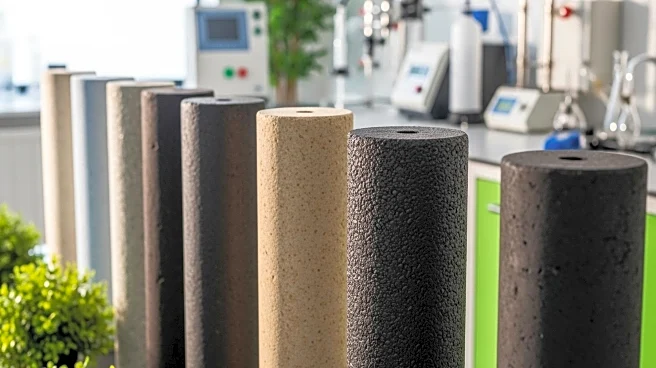What is the story about?
What's Happening?
Recent research has unveiled biochar's potential to actively degrade pollutants in water, beyond its known ability to adsorb contaminants. Dr. Yuan Gao and his team at Dalian University of Technology have discovered that biochar can directly break down organic pollutants through electron transfer, a capability previously underestimated. This process accounts for up to 40% of pollutant removal, highlighting biochar's active role in water purification. The study emphasizes the importance of biochar's structural features, such as C-O and O-H functional groups and graphitic carbon structure, which enhance its electron transfer capabilities. This breakthrough suggests that biochar can be a more sustainable and cost-effective solution for wastewater treatment, reducing the need for additional chemicals and lowering sludge production.
Why It's Important?
The discovery of biochar's direct degradation capabilities marks a significant advancement in environmental engineering, offering a greener and more efficient method for water purification. This innovation could lead to reduced operational costs for water treatment facilities and decreased chemical usage, benefiting both industries and communities. As industrial pollution remains a global challenge, biochar's enhanced functionality provides a promising solution for cleaner water and healthier ecosystems. The research conducted by Dr. Gao's team paves the way for smarter biochar design, potentially transforming wastewater treatment practices and contributing to sustainable environmental management.
What's Next?
The findings from this study may prompt further research into optimizing biochar's structural properties to maximize its pollutant degradation capabilities. Water treatment facilities and environmental agencies might explore integrating biochar into existing purification systems, potentially leading to widespread adoption of this technology. Additionally, the study could inspire innovations in biochar production, focusing on enhancing its electron transfer efficiency. As the environmental engineering field continues to evolve, biochar's role in sustainable water management is likely to expand, driving efforts to address global pollution challenges.
Beyond the Headlines
The implications of biochar's newfound capabilities extend beyond immediate environmental benefits. This research highlights the importance of interdisciplinary collaboration in advancing green technologies, combining insights from chemistry, materials science, and environmental engineering. The study also underscores the potential for biochar to contribute to carbon sequestration efforts, aligning with broader climate change mitigation strategies. As biochar's applications grow, ethical considerations regarding its production and use may arise, necessitating careful evaluation of its environmental impact and sustainability.















